 |
|
|
|
You are in: Future Mindsets : The Singularity
The Singularity
The Singularity is a future event horizon that we may be approaching due to exponential technological progress. OK, so what does this mean?! Well, the idea is that technology is now advancing so rapidly that are headed toward a moment -- "the Singularity" -- beyond which it is impossible to see (hence the "event horizon" bit), but beyond which almost anything will be technologically possible. The notion of the Singularity is widely discussed in future studies. The idea was first popularized by legendary futurist Ray Kurzweil in his 2005 book The Singularity is Near: When Humans Transcend Biology. Today, websites such as the Singularity Hub and Humanity+ provide popular coverage of Singularity-related developments, while organizations such as the Singularity Institute and the Singularity University proactively advance advancements toward such ends. You can also learn more in my video Singularity or Decline?. While the Singularity is a popular concept, an absolutely clear and widely accepted definition of the term remains somewhat elusive. Many (such as the Singularity Institute) explicitly define the Singularity as "the technological creation of smarter-than-human intelligence". However, others -- such as the Singularity University and myself -- more widely link the concept with the advancement and interlinkage of "exponential and disruptive technologies". Such distinctions noted, there is little disagreement about the Big Idea of a fast approaching moment in time when new technological advancements will make the impossible possible. In a sense the Singularity is therefore a hoped-for 21st century equivalent of the Industrial Revolution. And looked at in this respect, it is also not that outlandish a proposition. The Singularity and New Forms of IntelligenceAs already noted, the Singularity is strongly associated with the development of "beyond human intelligence". Such intelligence may be created artificially in a computer. Alternatively, it may result from an augmentation of the human brain, or the internetworking of many humans and machines to forge a collective intelligent entity. The latter is perhaps the most likely, and already something we can observe occurring as human beings and machines increasingly and more fluidly interconnect online in a manner that is starting to permit the "crowdsourcing" of new resources and ideas. 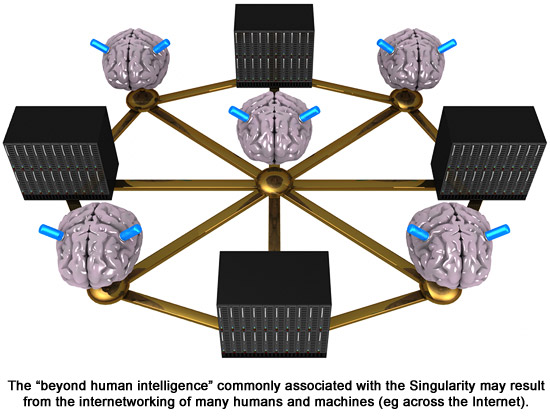 However it may be created, the application of beyond-human intelligence associated with the arrival of the Singularity will spiral us around a positive Singularity Feedback Loop. Here increased intelligence will create even more powerful technology. This will then create further heightened intelligence, and so on. 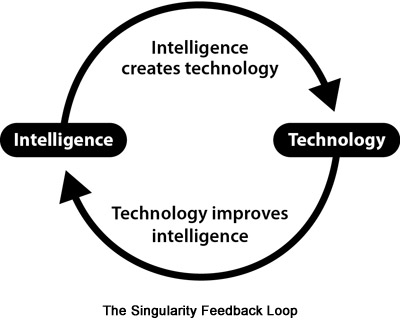 The above notion is already far from just an idea. For example, today one of the most sophisticated things we can manufacture is a microprocessor. Already some of these chips feature over two billion transistors on their silicon wafers. The positioning of all of these components and their wiring is therefore a logistical nightmare. It is indeed a task well beyond any human being. As a result, the layout of the wiring and transistors on a microprocessor has for years been something that can only be performed by a computer. The sophistication of next-generation microprocessors is therefore limited to a large extent by the "intelligence" of the microprocessors used to design them. If a microprocessor can be used to design a chip that is more sophisticated than itself, then in turn an even more sophisticated chip can be designed, and so on. In the world of computing, the feedback loop illustrated above is therefore very real and has already cycled through a great many iterations. The Singularity and the New Industrial ConvergenceIn practical terms, when the Singularity is reached we will start to master many emerging and converging sciences including artificial intelligence, nanotechnology, genetic engineering, 3D Printing, robotics, cybernetics and synthetic biology. Due to the above, the Singularity is inevitably and strongly associated with the notion of the New Industrial Convergence. As illustrated below, what this means is that as we approach the Singularity, so the boundaries will fall between the currently fairly discrete industrial activities of manufacturing, medicine and the media. This is because an increasing number of engineers, doctors and computer scientists (and their creations) will start to work with the same kinds of ideas and techniques at the same kinds of near-atomic scale. The large differences that currently exist between manufacturing an inorganic object, repairing or augmenting the human body, and programming a computer or otherwise mashing digital content, may therefore rapidly diminish. 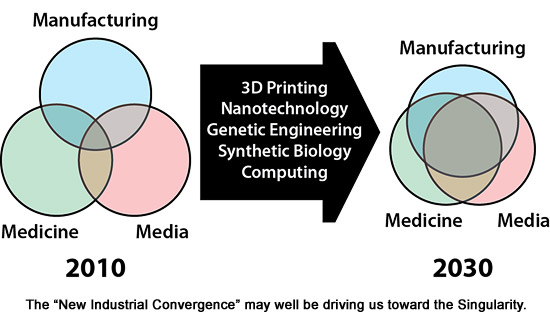 Utopian Times Ahead?So the argument goes, beyond the Singularity we will be able to reprogram and control all forms of life and all modes of inorganic matter. Beyond the Singularity it ought therefore be possible for us to achieve many amazing and incredibly useful things. While by definition we cannot yet predict or understand what all such things could be, they may well include:
Singularity or Decline?The above may all sound wonderful and too good to be true. After all, if the Singularity can deal with all of the global challenges we now face, then what have we to worry about? This is indeed an argument that some people are already quite dangerously starting to make. Granted, it does now seem **possible** that we will develop levels of intellect and technology that will allow us to overcome things like Peak Oil, climate change and resource depletion. But the fact that new waves of technological progress have lead to the advancement and salvation of humanity in the past in no way has to **guarantee** that this will automatically happen again. 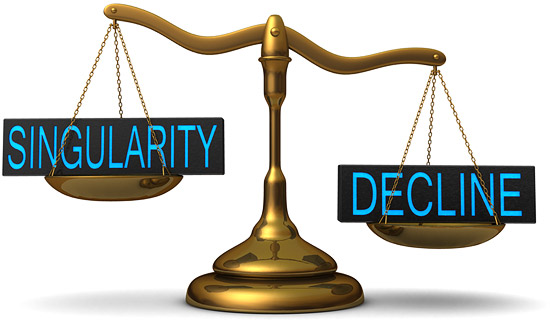 Shirking our individual and collective environmental responsibility by relying purely on the promise of future technological progress is a very dangerous survival strategy. That significant proportion of the population who seem to be counting on such a proposition ought therefore to reflect long and hard on the fact that the challenges we now face could very easily overwhelm us long before the Singularity can be reached. Rather than Utopian times ahead, there therefore remains a strong possibility that the decline of industrial civilization could fairly soon be on the horizon. A Time for Positive ActionThe Singularity will not just happen by itself. Every technological innovation that may contribute toward its attainment is after all currently a human endeavour that needs significant intellect and physical resources devoting to it for long enough for progress to be achieved. And time is now most certainly not on our side. Indeed, I would argue that whether we are headed toward Singularity or decline is likely to depend on actions taken us all over the next 20 years. This is also the case for three reasons.
Firstly, widespread resource depletion has yet to kick in, which leaves us with a last little bit of breathing space in which to collectively act. Secondly, many post-Singularity technologies have already been identified, with a large number just waiting for investments that could deliver astonishing scientific breakthroughs. And finally, despite the ongoing financial crisis, most economies are still functioning effectively, with many governments and companies still able to engage in long-term strategic action. What the above points mean in aggregate is that a conscious choice between Singularity or decline can still be made. Our biggest global challenge is therefore persuading enough people to work together toward a lean, green age in which we will all rely on technologies that are currently almost unimaginable. More information on The Singularity, associated technological developments, and their relation to the current future challenges we all now face, can be found in my book 25 Things You Need to Know About the Future. I also discuss The Singularity in some depth in The Next Big Thing, including in the Prologue which you can download here. Return to Future Mindsets. |
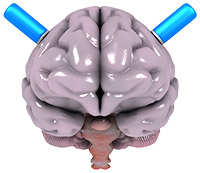 The Singularity is a future event horizon of exponential technological progress, and commonly associated with the development of beyond human intelligence. RELATED VIDEOS Singularity or Decline? Life Extension 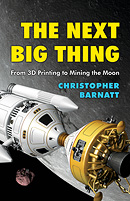 Learn more in "The Next Big Thing". |
|
|